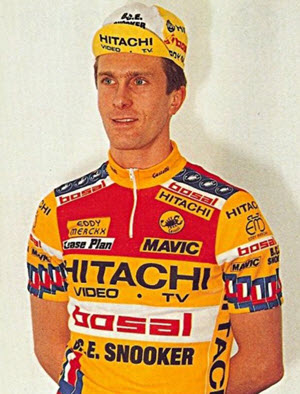
It’s hard to believe it’s 10 years since last I spoke to Paul Watson about a great ride he pulled off in 1987.
Paul Watson? I hear you question.
He was British Amateur Road Champion in 1985, the same year as he was third in the Tour of Britain, ‘Milk Race’ behind Liege-Bastogne-Liege winner, Eric Van Lancker of Belgium and the man who should have been a super star but never quite was, Roy Knickman (USA).
He rode pro with Van Lancker’s Belgian Fangio team at the end of that year but returned to Britain to ride for Raleigh in 1986.
The 1987 season saw him join the now legendary ANC squad and pull off some excellent results like third in the hotly contested season opening La Marseillaise and a stunning sixth among the very best of company – Roche, Criquielion, Madiot, Golz – in the tough Ardennes Classic the Flèche-Wallonne.
He started the Tour de France but was DNF with his morale completely shot from the rigors of the 80’s ‘pro life.’
However, his ’87 Flèche ride had brought him to the attention of Criquielion’s Splendor team who signed him for season 1988.
What should have been the start was actually the end and there was no 1989 road season for Watson.
He went off to race in the fledgling MTB scene in the US in 1989 after a ‘brush with authority’ and that was that …
… Until he went and won the International Cycling Federation 50+ World Road Championship in Belgium the other day, that is.
VeloVeritas pal Al Hamilton pointed us in the right direction and we also had the help of Joscelin Ryan in Belgium to set up this interview; here’s what Mr. Watson had to say about his win and his past career…
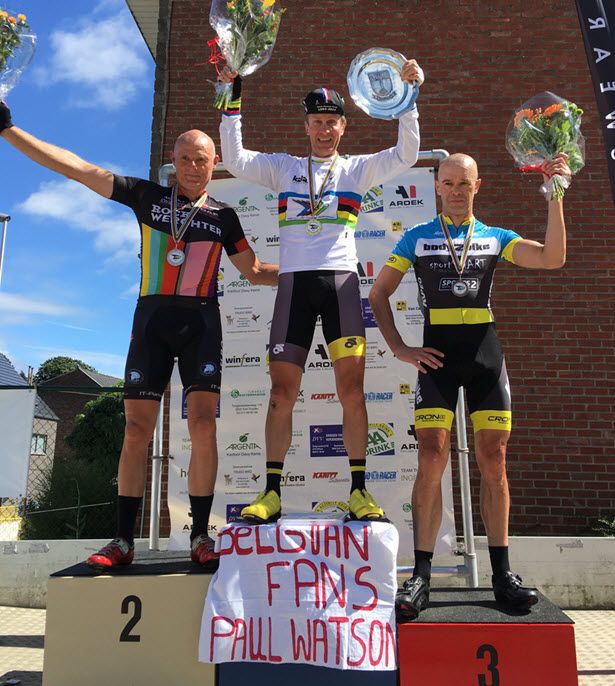
Congratulations, Paul – why come back now?
“Last November I decided that I was so out of shape I had to do something, the ambition was to tone my upper body. But I started to use the cross trainer and could see that my watts were steadily improving – this whole ‘training on power aspect’ was new to me, that wasn’t around in the eighties.
“I was curious about it and started asking around as to what would constitute decent average watts over a set period. I decided to get back on the bike – that was April 2nd – but I took a battering on my first ride, in fact I was battered all of April and into May.
“I was training in Belgium in May and met Dr. Kris Van Der Mieren who is the team doctor for the National Belgium Team, he said that I should be careful coming back, sometimes pros hearts are damaged from all the work they did during their career and to come back can be dangerous; but he did the ramp test with me and gave me the all clear – and has been advising me since.
“Then I went to Denia in Spain in June for three weeks to train and rode my first race on July 6th, an Elite Kermis at Oplinter in Belgium, 120km in the rain with 120 riders but only 65 finishers, I finished 45th. I was well pleased with that – and I’ve only ridden Elite races since.
“I’ve been staying with the Dave Rayner Funded guys at Cafe Sur Place and hopefully I’ve been able to help them with advice.
“The Rayner Fund is great, there was nothing like that back in the eighties and it’s great these lads being able to come over here and get into the thick of it through the fund.”
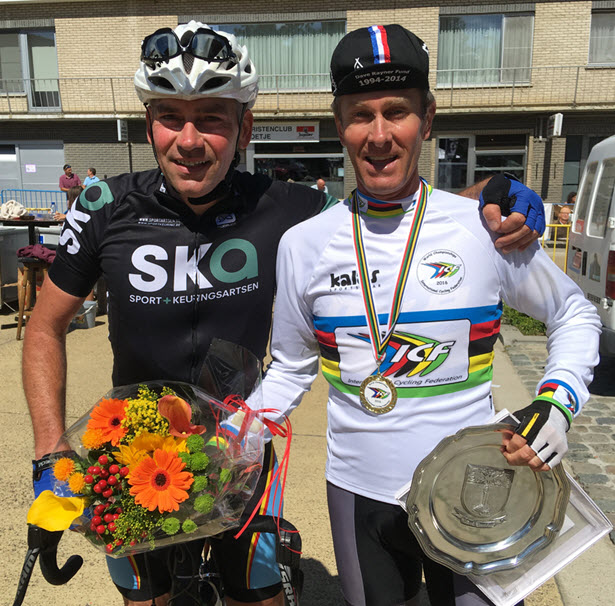
Tell us about the title race, it’s not the UCI Vets Worlds, is it?
“No, it’s the International Cycling Federation Championship which most say is more hotly contested than the UCI one which in Perth, Australia this year.
“The races for the various age groups were held in Belgium in the St. Truiden district at Groot Gelmen, there were 97 starters with 25 of those ex-pros.”
Talk us through it please…
“It was a 6.5K circuit with two punchy climbs, both of which came straight off ‘dead’ left hand turns – I thought it was a great circuit. I strung it out on the first lap and kept it going so that it split down to 10 of us then on the second lap it split again down to just four.
“Then another 10 came up to give 14 up front, the guy who would eventually finish second clipped off and I got up to him on the climb. That was it; we were away for the second half of the race albeit we never had more than 35 seconds on the rest.
“I didn’t want to take any chances with the sprint – I’ve been having a few problems with my stomach when I make really big efforts – so on the climb two K from the finish I attacked, got the gap and won by 12 seconds.”
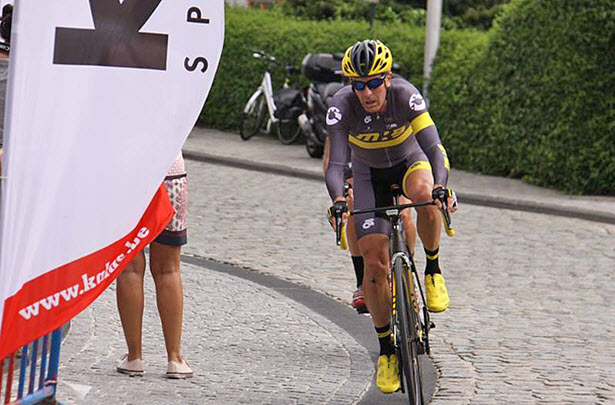
What now then, Paul?
“Well, I do think it’s a clean sport now, so if you train hard, eat well, rest and race hard you don’t have to worry that you won’t get results because others have ‘an advantage.’ The reason I’m doing this is that I want to see how far I can – as a 55 year-old guy. But if someone asks me about my age and how I can’t do this or that I just tell them; ‘look, I don’t want to hear it!’
“It’s a personal exploration, I’m doing it 100% properly – nutrition, rest, medical supervision, training…
“I think I have a lot more to come; they show you those charts and graphs about how your VO2 max and heart and watts deteriorate as you get older. I think that’s all bollocks! Maybe it applies to truck drivers but if you’re dedicated and looking after yourself it’s different; hopefully I can be an inspiration to guys?”
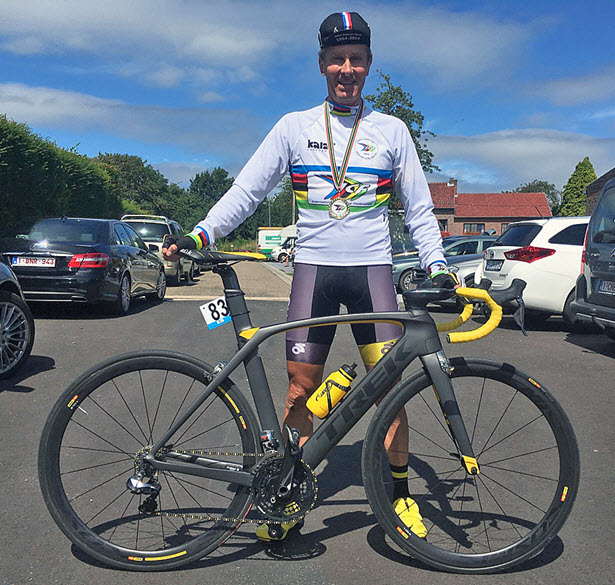
I see you’re on a nice aero Trek these days – what about all this new ‘trick’ kit, wee bit different from your ANC Peugeot?
“It’s amazing, I’m really enjoying all this new stuff – Garmins, Strava, power meters.
“I’m loving all that, there’s so much to get excited about, isn’t there?”
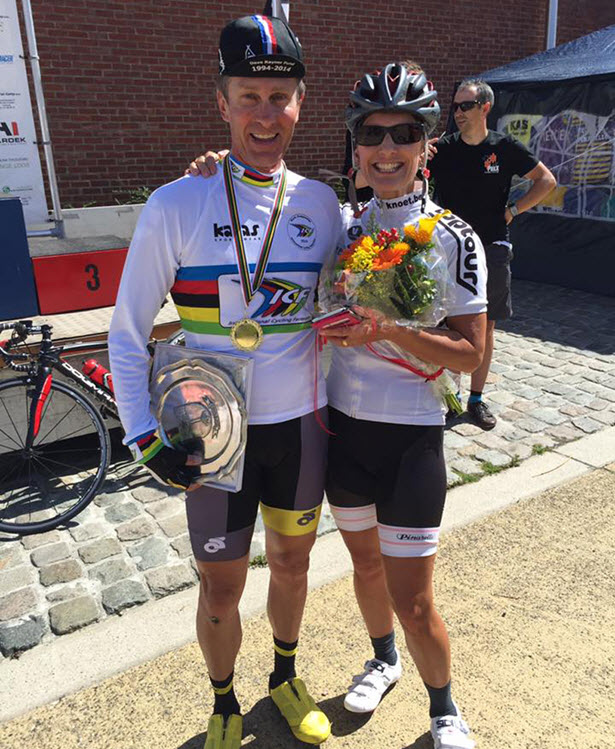
Paul was originally a cyclocross rider, capable of making the podium in the British national championships and in continental ‘crosses – but he made the transition to the road and the big results weren’t long in coming.
Being a Scot I just had to ask him about his stage win in what used to be the UK’s premier stage race – discounting the National Tours – The Girvan Three Day. Held at Easter the race had a reputation for tough parcours over the hilly southwest of the country – and weather which could range from mellow spring sunshine to white-out snow blizzard.
The year was 1985 and he’d go on to win a stage in the Tour of Britain ‘Milk Race,’ taking third on GC and then grab the British Amateur Road race title as well as a top finish in the ‘Worlds.’
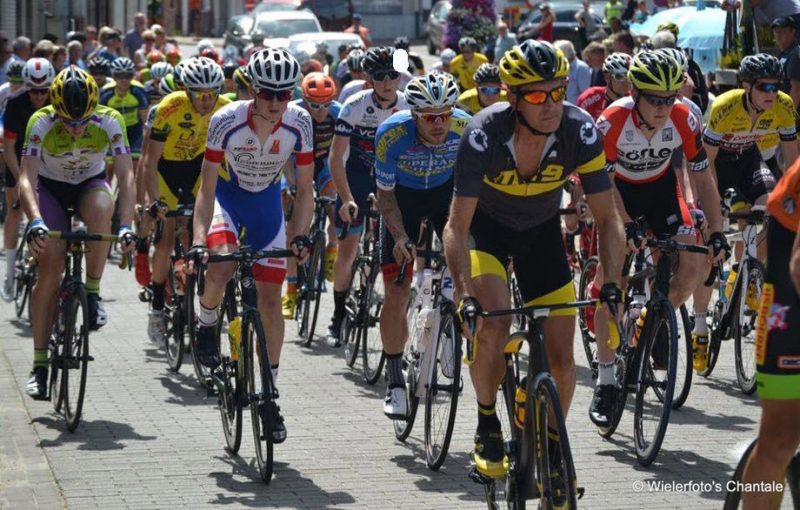
What are your memories from ‘the Girvan’ in 1985, Paul?
“The stage started with a whacking big climb out of Girvan, I lined it out from the gun with the intention of hitting it hard on the climb. But then I punctured!
“Of course, because I’d lined it out the service cars were way back and I had to wait an eternity for a wheel – the service guy told me that I lost eight minutes.
“I chased and chased all day, from group to group and only caught Paul Curran (top British road and track rider of the era, ed.) who was away on his own, inside five miles to go.”
I’d actually forgotten about your fine ride in the ’85 Worlds where you took 14th…
“Brian Holm and I jumped across from the bunch to the break, we caught them with 1500 meters to go and I took a flyer because I knew I wouldn’t be up there in a sprint.
“As I went down the left hand side of the road, Brian went on the right – we were brought back and the Pole, Lech Piasecki won it. I ended up 14th in the final reckoning.”
Piasecki would go on to wear yellow in the Tour de France and win the world professional pursuit title whilst you ended the year riding with Milk Race winner Van Lancker’s Fangio team…
“They’d seen me get third in the Milk Race and offered me a place on the strength of that.
“Looking back I wish I’d stayed with them for 1986 because Fangio eventually became ADR and that team had a lot of success – Lemond won the Tour for them.
“But I got a good offer to ride for Raleigh in the UK for ’86 and accepted it.”
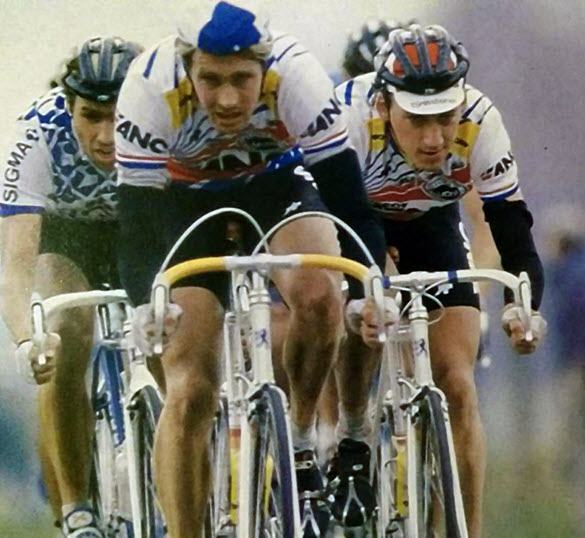
In 1987 you were offered a place with the now-cult ANC squad, managed by British amateur cycling legend, Phil Griffiths.
“Yes, it was Mickey Morrison who approached me to join Lycra-Halfords – but we raced in ANC colours abroad… it was certainly a year to remember!
“I got third in the season opener, La Marseillaise, but we were thrown so in at the deep end.
“And remember, there were no mobile phones or laptops back then and our preparation was nothing like the continental riders had.
“We had some good lads in that team like Joey McLaughlin, who won the 1986 Milk Race and 1987 Tour of Britain, and Malcolm Elliott, who would go on to win the points jersey in the Vuelta. We had Adrian Timmis too, who won a stage in the Midi Libre. Slowly we started to find our feet.
[vsw id=”PHQm_h_V-94″ source=”youtube” width=”615″ height=”450″ autoplay=”no”]
“I got sixth in the Flèche-Wallonne on one of those days where it all just falls into place for you and you can do no wrong; and Malcolm was third in the Amstel Gold race – so on the strength of those rides organizers wanted us in their races.
“We rode a lot of the big races and by the time the Tour de France came round I was exhausted and abandoned. I was never going to be a Grand Tour rider; I could have been a good Ardennes Classics rider and performed in the late season races, resting in the summer – but the Tour was just too much for me, my morale was shot.”
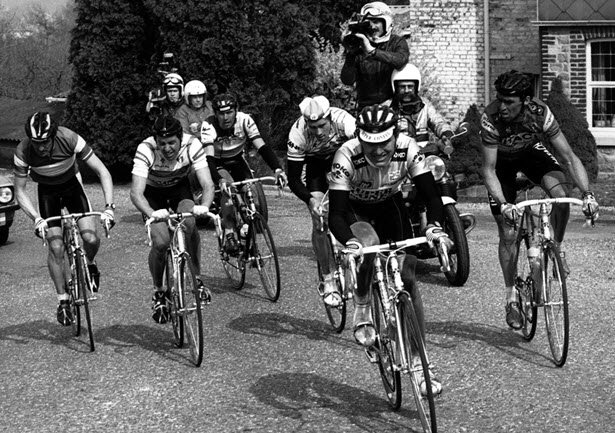
There were tales of a somewhat fractious relationship between you and team manager, Phil Griffiths – do you get along now?
“Phil has mellowed a lot, we all have and everyone was under pressure back then, not just the riders, Phil must have been under huge pressure from Tony Capper who owned the team – and there was always a shortage of money.”
Despite your Tour DNF and loss of morale you received an offer to ride for Claude Criquielion’s Hitachi squad for 1988 – your sixth place in the Flèche hadn’t gone unnoticed?
“They were really good guys at Hitachi, Claude Criquielion, Marc Sergeant, Dirk De Wolf, I have nothing but good memories of the team…
“But my head had come off with pro cycling, I was disillusioned.
When Criquielion died last year Paul related the tale of when he was riding for Claudy the Englishman was chatting back in the peloton when he should have been up front chasing for his Boss.
The Belgian slid back through the bunch, found Watson and dragged him by the ear up to the front of the string to do his job – much to the hilarity of the whole peloton.
[vsw id=”epEt399wcyE” source=”youtube” width=”615″ height=”450″ autoplay=”no”]
Despite a lack of results there was a ride with the team there for you in 1989 if you wanted it?
“At Xmas 1988 I had a few drinks and got pretty relaxed with a journalist from the Guardian newspaper (Geoffrey Beattie) and told him about what I’d seen in the pro peloton – guys injecting themselves in races and the likes.
“I thought we were just chatting socially, off the record – he was a Sheffield guy like me – but I was naive; he wrote an article around it.
“The British Cycling Federation saw it and rather than do anything about what I was saying, they chose to refuse to issue me with a race license.
“In fairness to Hitachi they tried to help and get the ruling overturned – and Brian Holm said there was a place for me with him at the Sigma team but we couldn’t get the BCF to budge and that was that.”
You have some strong views on the subject of drugs in cycling.
“I think there’s a lot of hypocrisy within the media; on the one hand they condemn drug taking but then someone like me who walks away because they can’t handle what’s going on all around them is criticised because I ‘couldn’t make it’.
“I mean, one minute you’re riding alongside big Bert Oosterbosch in the peloton and the next you hear he’s dead…
“I chose to take the moral high ground but when I see articles about my career I read that I ‘showed promise but didn’t deliver’.”
Your next move was to head west across the Atlantic to the Land of the Free where the mountain bike scene was exploding; ideal for a man with a cyclocross history and all that road core.
“Yes, the MTB scene was non-UCI at that time, brilliant, with BMX-ers and the roadie crowd coming in to it.
“No one knew me but within three or four weeks I was picking up regular top six finishes and so Marin signed me.
“I was good on the climbs but guys like Tomac – boy, could they descend!
“I realised I had to get better technical skills and spent the whole of that winter working on that aspect.
“I used to go out with a guy who was a good descender and eventually I was at the stage where I thought; ‘yeah, I can do this’.
“But three or four weeks before the season started I fell off a cliff and broke my arm – there was nerve damage too and it took 18 months before it was right.
“Marin were good and gave me a job in team management which was great because I picked up skills to prepare me for ‘civvie street’ – how to run an office, work computers. I ran the team for three years and came back to the UK in 95/96.”
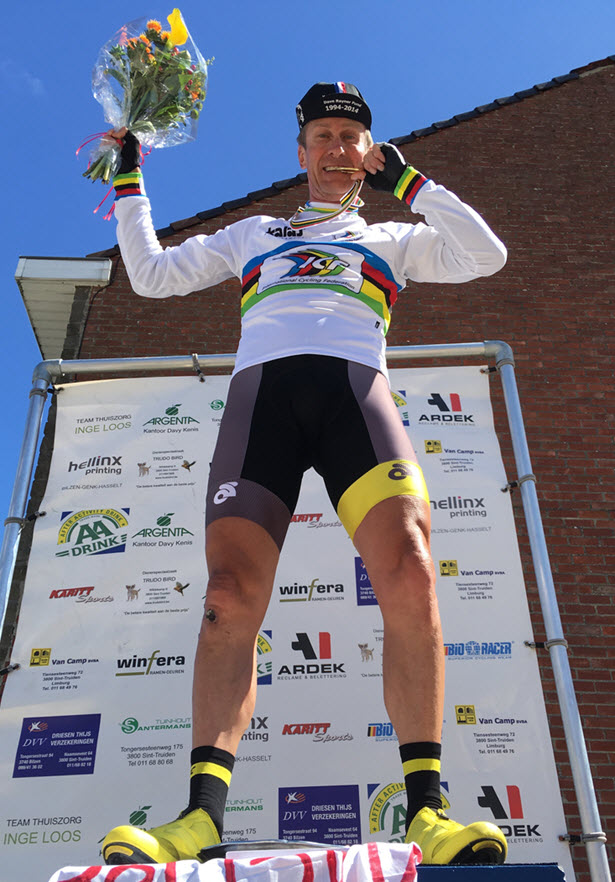
The inevitable question, any regrets?
“Well, I do wish I’d stayed with Fangio at the end of ’85 or managed to continue with Hitachi.
“But then again, that’s a difficult one because that would have lead me right into the start of the EPO era…”



